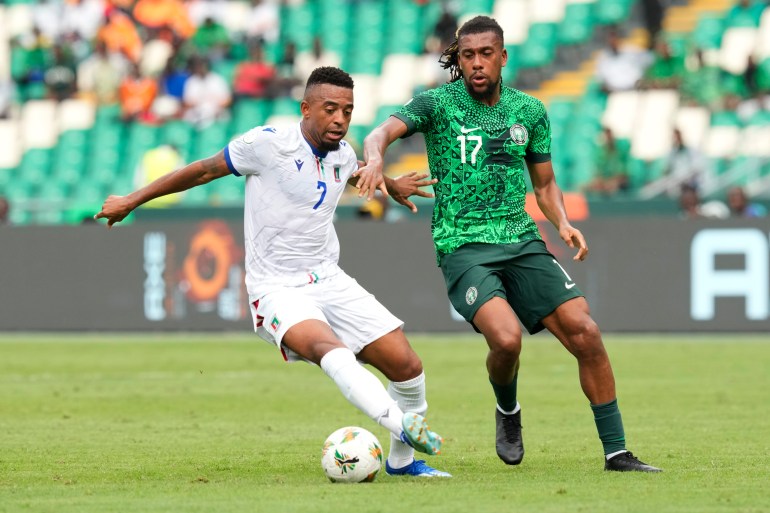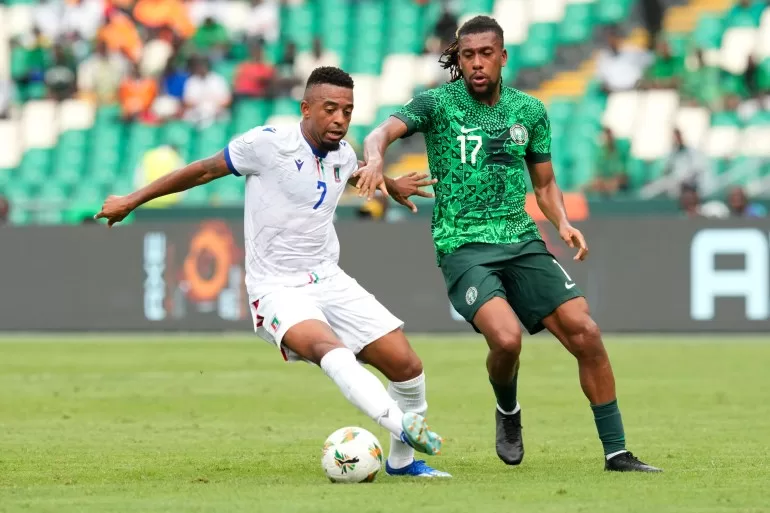The action was in response to a barrage of hate speech on his social media accounts, as disappointed Nigeria supporters sought an outlet for outrage following the Super Eagles’ 1-2 loss to hosts Ivory Coast in Sunday’s final.
The Fulham midfielder started six of seven matches in the tournament and was instrumental to Nigeria’s unexpected run to the final despite playing a more withdrawn role than is natural to him.
He was similarly targeted online following his sending-off in the defeat to Tunisia that caused Nigeria’s round-of-16 exit in the 2021 edition of the tournament. Then, as now, he was forced to archive his social media posts; this time, however, there are reports that he may be set to retire from international football.

Section head
Iwobi, who has won more than 70 caps for Nigeria since making his debut in 2015, is a nephew to legendary Nigeria midfielder Augustine “Jay-Jay” Okocha, widely regarded as one of the best dribblers in world football.
Throughout his career, 27-year-old Iwobi has been burdened by comparisons to his uncle, who won the AFCON in 1994, with many expecting similar flamboyant performances as the former Paris Saint-Germain and Bolton maestro.
While those are big shoes to fill, Iwobi has surpassed Okocha’s international appearances and enjoyed a solid career in the Premier League.
His versatility has also seen him play different roles, including at AFCON where, according to the player himself, he was tasked with safe circulation and helping the team keep its discipline without the ball. “I am meant to manage and work for the team,” he explained on the eve of Nigeria’s quarterfinal victory over Angola. “The role me and [midfield partner] Frank [Onyeka] have been told to do is to manage the game as best we can, but first and foremost to defend as a team.
“We have creative players upfront whether it is Samuel Chukwueze, Ademola Lookman and Moses Simon; there’s a lot of creativity in there,” he said. “I’m just trying to do my job for the team, and if there’s anything to help the team win, it’s what I’m prepared to do.”
Despite his explanation, he has been the subject of renewed abuse, ranging from criticism of a perceived lack of creativity and risk-taking to disrespectful, hateful comments about the legitimacy of his familial link to Okocha.
This even though Nigeria’s progress to the final was unexpected, with the likes of 2021 champions Senegal and 2022 World Cup semifinalists Morocco touted as favourites until they bowed out early.
In November, the Super Eagles began their qualifying campaign for the 2026 World Cup with consecutive draws against Lesotho and Zimbabwe, not only imperilling their chances of qualification but casting doubt over their AFCON prospects and the competence of Portuguese coach Jose Peseiro.
Still, Nigeria went through the group stage unbeaten, scored in every match and conceded only one goal from open play leading up to the final on Sunday. The backlash following the defeat on Sunday has, however, centred upon the standard of the Super Eagles’ performance, which many deemed lethargic. Iwobi, who was substituted in the 79th minute with the score tied at 1-1, has become something of a lightning rod for fan ire.
The hate has been so vehement that members of the Nigeria squad have taken to social media to post messages condemning it and supporting Iwobi.
Midfielder Wilfred Ndidi, who missed the tournament due to injury, posted on Instagram, saying, “It’s very sad the way we troll. The difference between our jobs is that our mistakes are televised; we all make mistakes but only few people see your bad days at work.”
“Some troll for vibes, social media engagements, increase of followers and so on, not even minding the mental state of the victim,” he said. “But when something happens to the victim, we come back to social media to ask hypocritically why the victim didn’t speak up. Let love lead.”
Team captain Ahmed Musa posted on X that “cyberbullying is not only a violation of decency but a huge crime” and called for a show of “genuine love and support to our players”. Striker Victor Osimhen told Al Jazeera that “this unnecessary aggressive behaviour is unacceptable”. “We all fought for the colours of our country, win or lose we are together,” he said.
Okocha, who has often denounced the unfair criticism directed towards his nephew, had this to say to the online trolls and abusers: “I pray for my country Nigeria and the people that can only hate and see nothing good in others; when effort counts for nothing. Treat people the way you want them to treat you, all we have in this life is each other.”
While there has been no official confirmation of the reports of Iwobi quitting the national team, there are concerns that the cycle of abuse could affect Nigeria’s chances when it comes to courting the interest of players in the diaspora.
Over the last decade, more foreign-born players have been integrated into the team; five of the starting 11 in Sunday’s game, including Iwobi, were born overseas.
Following the team’s AFCON elimination in 2021, goalkeeper Maduka Okoye, who was born in Germany, was inundated with so much hatred online – including threats to his life and family – that he not only deactivated his social media accounts but has excused himself from international selection ever since.
